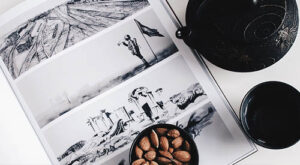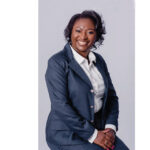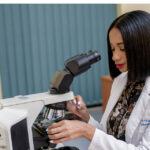Dr Iyaloo wanted to conquer HIV
Dr Iyaloo Konstantinus’ inquisitive mind did not allow her to settle less than her dreams and when the HIV was devastating communities, she wanted to discover the cure for it. She told Inspirational Women in Business magazine she wanted to work with viruses and even have her own research centre of virology.
Q: Briefly tell us about yourself.
A: I grew up in a middle-income family in Ongwediva where members of the extended family came from the village to attend school and college as my parents brought up not just their own children but also those of other family members.
I was an energetic and inquisitive child and I loved climbing trees, attending church and Sunday school. I attended Oshigambo High School, where one day I left my book under a tree to take a study break and found a goat munching my text book pages.
I attended the University of Pretoria where I did my undergraduate programme.
Q: What is your occupation and why did you choose it?
A: I am a scientist who specializes in medical virology. I wanted to discover the cure for the Human Immunodeficiency Virus (I don’t know if that will happen now, laughs). Having the virus wreak havoc in our society was my motivation to try to seek solutions and understand how it works. Families were wiped out and this to me was devastating as some children were left orpharned.
People used to ask me when I came home for holidays what exactly I was studying and what I would be when I completed my studies. I always explained that I wanted to work with viruses and even have a research centre in virology.
It wasn’t until Covid-19 broke out that my parents also understood my career path after hearing about virologists on the news during the pandemic.
Q: There are those who knew with certainty what they wanted to be when they grew up – and then there is the rest of ‘us.’ In which group are you and how many ‘wrong turns’ did you make before arriving here? What ‘lessons learned’ if any?
A: Careers are man-made, so I think there will always be that window of uncertainty. I wanted to be an astronaut as I’ve always been fascinated by the Milky Way galaxy. I later realized this was not going to be feasible in our country, as we are just centuries behind in technology. If you had asked me 20 years ago, I wouldn’t have told you I wanted to be a virologist. I didn’t know what that was until I went to the University of Pretoria. I initially wanted to do medicine, but in a pre-med course in my first year, the journey of discovery started when I was exposed to courses I never knew existed.
I completed my undergraduate degree specializing in Human Physiology, Human Genetics and Human Psychology, and worked for AstraZeneca for two years, and this company further exposed me to the world of science.
I wanted to study how pathogens affected our health so I could contribute to solutions, including vaccines and cures. I left AstraZeneca to continue my studies for another eight years to complete my PhD in Medical Virology at the University of Cape Town. What I have learnt is that we only choose careers based on what we know; therefore, exposure is very important as it opens up our minds to a world of possibilities.
Q: As a professional, do you have any role models you look up to – inside and outside your field?
A: My first role models are my parents, who managed to both acquire their Masters in Education just after independence. They inspired me from a very young age as I watched them contribute to shaping the delivery of education in our country. I grew up surrounded by shelves of books, and my parents even bought some encyclopedias for us to read. I look up to my parents professionally, as they taught me ethics and hard work.
My other role model ismy husband, who has been part of my biggest support and motivator throughout my undergraduate and postgraduate studies. Hailing from informal settlements, unlike me, who was privileged to grow up in a middle-income family, he completed his PhD despite all odds. His childhood journey to getting where he is right now has been one of the motivations that kept me going. He is my mentor professionally, and he always challenges me to aim for the sky.
Q: What challenges have you met on the job, which are brought about by being female, and how do you solve them?
A: I have been blessed to work with other women who are determined to contribute to uplifting this country. This is great when women support each other for the benefit of al of us. In Namibia, the medical laboratory sciences are dominated by women, and perhaps it is a bit different from careers that are male-dominated. I once had an online meeting with a Senegalese delegation on infectious diseases, and they were all male while the two of us from Namibia were female, and they commented that Namibia must be a nice country because of the women in leadership positions in this field. It was one of those proud moments to realize that we are actually making progress in our country.
Q: How do you balance being a mother or wife and professional? What have you sacrificed personally and professionally at each stage of your career?
A: My greatest sacrifice was during my postgraduate studies. I had to leave my 11-month-old daughter with my parents. Four years later, towards the end of my Masters’ programme, we welcomed our son, who I later also left with my parents at 11 months to continue my PhD studies. This was a huge sacrifice, and I almost quit, but because of the support from my husband, and my parents, I continued. In fact, in the last three years of my studies, we re-united, and although managing studies with family in a foreign country also had its challenges, it was comforting and worth it.
The challenge now as a working mother and wife is that I don’t live in the same town as my family. I don’t think mothers were supposed to balance between work and family. We, as a country, need policies in place to ensure that mothers have the opportunity to raise healthy children while they are still working. Some first -world countries already have this in place, such as a fully paid maternity leave ranging between 6-12 months. Three months is inadequate considering that one has to take one month before the baby arrives, leaving only two months with the baby.
Q: What advice would you give to women aspiring to take up a career like yours
A: Perseverance is key to achieving your goal. When I look back at my journey, there were so many times I wanted to quit, but I am grateful that I persevered. I also believe the Almighty has been guiding and protecting me through this journey. My message is to have faith, set your goals, and go out there and work towards achieving them.
Q: What does International Women’s Day mean to you?
A: The day reminds me that we have a lot to do locally and internationally until we eradicate gender-based violence, rape, and inequalities. One must ask themselves what they are doing to ensure women are safe and protected in this world.
It starts with how we raise boys to respect and protect the girlchild because we are not in competition but to complement each other. Living in a country where girls are still missing school because they cannot afford hygiene products such as menstrual pads is a reminder that we still have a lot to do. I am glad Namibians are taking different initiatives to uplift the girlchild, and we should equally do so for the boys to ensure they are equipped to assist each other.
Q: Is there anything else that you think we may have omitted?
A: Nope, I think you did a pretty good job. I would like to thank you for a great interview.







